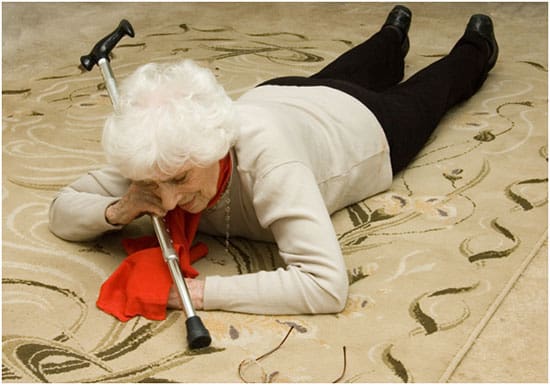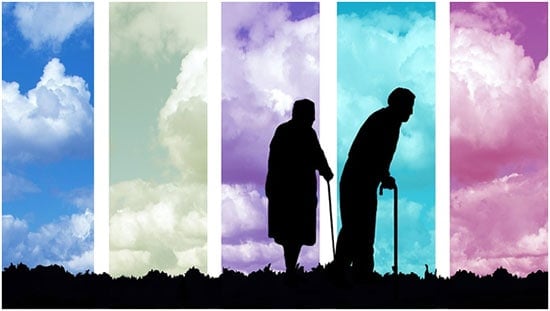
One of the greatest dangers a senior can face is falling, especially when no one else is around. Fall statistics for seniors are alarming. A senior is taken to the hospital for injuries related to a fall every 11 seconds. Even more alarming is the fact that a senior dies from fall related injuries every 19 minutes.
Every senior should take the dangers of falling very seriously. With that being said, seniors shouldn’t have to live in perpetual fear of falling every second of their lives. The best way to combat the danger of falling is to arm yourself with knowledge and taking the proper precautions. Here are 9 top causes of senior falls that may surprise you and how you can prevent them.
1) High Blood Pressure
High blood pressure is more than just a silent killer. It can also cause you to feel bouts of dizziness, especially after standing up quickly from a sitting or prone position. You can combat bouts of dizziness by standing slowly when seated or lying down. If you start to feel dizzy while walking, stop in place and wait until the dizziness has passed. High blood pressure can also cause you to faint, so make sure to support yourself against a wall or someone nearby when you feel dizzy.

2) Poor Balance
Balance is often compromised with age. This can be a significant issue when you’re attempting to catch yourself during a fall. Lack of movement and exercise play a significant role when it comes to slow reflexes and loss of balance. To maintain your equilibrium during a falling accident try to participate in physical activities on a regular basis. The activity doesn’t have to be significant, just something to keep yourself active.
3) Muscle Weakness
The older you age, the more your muscles will weaken. Eventually, your weakening muscle mass can become a significant problem that will make you far more susceptible to falling. You can’t completely avoid your muscles from weakening, but doing light exercises can help you to maintain the muscle strength needed to prevent a fall.
Places in The Home Where Falls Are Likely to Happen
Making your home senior safe should be one of your top priorities to prevent potential falls from occurring. Here are some of the top dangers for seniors who live at home:
4) Poor Lighting
Poor lighting can greatly contribute to falls. Without proper lighting, it’s easy to misread your steps and possibly trip as a result. Tripping over unseen obstructions is also a big danger to be aware of. A senior friendly home will have well-lit rooms and hallways. Save yourself time and effort by installing nightlights in the rooms you frequent the most and motion sensors outside so you can travel around your home without fear of falling due to lack of sufficient lighting.
5) Staircases
Understandably, staircases can be challenging to navigate the more you age. As a result, you’re far more susceptible to slipping and falling. Remedy this issue by installing hand railings you can firmly grip for the entire length of the staircase. You can further reduce your chances of having a falling accident by installing non-skid treads on the steps to ensure stable footing.
6) Bathrooms
Seniors are more likely to slip and fall in the bathroom than any other area in the home. The floor is often wet after a bath or shower which can greatly increase the chances of a falling accident. Furthermore, leading with a single foot to enter the shower (in combination with a slippery floor) is also a top cause for senior falls in the bathroom. To avoid an accident, install grab bars in and around your bath/shower which will provide a place where you can firmly grip as you move about your bathroom. You should also invest in non-slip mats to place on the floor so you can walk around without fear of slipping.
Prescription Drugs
The one major downside to prescription medication is the many side effects you may experience. While some side effects are minor, others can cause major issues that could possibly lead to a fall. In fact, medication related side effects are considered to be one of the major contributors to falling accidents amongst seniors. The following will increase your likelihood of experiencing a fall:
7) Mixing Prescription Drugs With Over The Counter Medication
It doesn’t matter if your medication is over the counter or prescribed by your doctor, you will still experience side effects. These side effects can be compounded and made all the more potent when you decide to mix prescription drugs with over the counter medication. Side effects may include drowsiness, extreme dizziness, and even unconsciousness. You should never mix prescription drugs with over the counter medication unless directed otherwise by your doctor.
8) Taking Prescription Drugs With known Side Effects For Throwing Off Balance
Painkillers and seizure medications are notorious for affecting the central nervous system and causing dizziness. The user’s reflexes are ultimately slowed, and as a result, they’re not able to act with enough speed to prevent a fall from occurring. Other medications that are notorious for causing the user to experience dizziness include heart, diabetes, and high blood pressure medications.
9) Taking Too Much Medication At One Time
Sometimes you don’t have a choice when it comes to the amount of medication you have to take to maintain your health. However, you should be aware that if you’re taking four or more medications at a single time, your chances of falling are greatly increased. To protect yourself, gather all of your essential medications and take yhem to your doctor. A medical professional should be able to examine the combination of medications you’re taking and inform you of whether or not you should continue taking your medication altogether or begin spacing out your dosages.
Preventing a Fall
Whether you’re aging in place, or if you live with loved ones, falls are a constant threat to your safety. The first step to preventing a fall is identifying all the scenarios in which a fall can take place, thus allowing you to pre-plan to minimize the possibility of that scenario playing out. Don’t become a statistic. Prevent yourself from falling with proper preparation and arming yourself with as much knowledge as you can.
Featured Image Credit: Deposit Photos – Lic # 133785020


